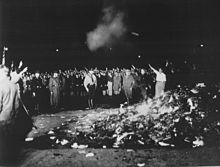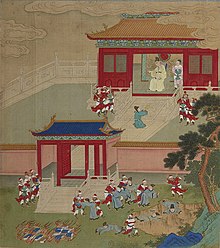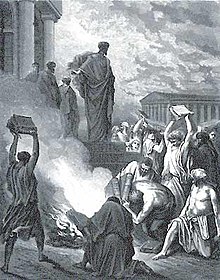Book burning
Appearance







Book burning is the ritual destruction by fire of books or other written materials, usually carried out in a public context. The burning of books represents an element of censorship and usually proceeds from a cultural, religious, or political opposition to the materials in question.
Quotes
[edit]- There is more than one way to burn a book. And the world is full of people running about with lit matches. Every minority, be it Baptist/Unitarian, Irish/Italian/Octogenarian/Zen Buddhist, Zionist/Seventh-day Adventist, Women's Lib/Republican, Mattachine/FourSquareGospel feels it has the will, the right, the duty to douse the kerosene, light the fuse. Every dimwit editor who sees himself as the source of all dreary blanc-mange plain porridge unleavened literature, licks his guillotine and eyes the neck of any author who dares to speak above a whisper or write above a nursery rhyme.
- Ray Bradbury, Afterword to the 1979 edition of Fahrenheit 451
- "Do you ever read any of the books you burn?"
He laughed. "That's against the law!"
"Oh. Of course."- Ray Bradbury, Fahrenheit 451, p.8
- Books won't stay banned. They won't burn. Ideas won't go to jail. In the long run of history, the censor and the inquisitor have always lost. The only sure weapon against bad ideas is better ideas.
- Alfred Whitney Griswold, Essays on Education as quoted in The New York Times (24 February 1959).
- Dort, wo man Bücher verbrennt, verbrennt man am Ende auch Menschen.
- Where one begins by burning books, one will end up burning people.
- Heinrich Heine, Almansor.
- Where one begins by burning books, one will end up burning people.
- Sultan Sikander (Aurangzeb) was the most bigoted of the Sultans, and burnt the books of the Hindus whenever and wherever he got them.
- Sayed Ghulam Husein, in his ‘well-known book, Sair Mutakhreen (Vol. 1, p. l 40). quoted in Har Bilas Sarda , Hindu Superiority (1922), p. 139
- It is not surprising therefore that many Muslim heroes in their hour of victory just set libraries to flames. They razed shrines to the ground, burnt books housed in them and killed Brahman, Jain and Buddhist monks who could read them. The narrative of Ikhtiyaruddin Bakhtiyar Khalji’s campaigns in Bihar is full of such exploits... Similarly, only one instance may be given to show how the Indians tried to protect their books from marauding armies. In the Jinabhadra-Sureshwar temple located in the Jaisalmer Fort in Rajasthan, I saw a library of Jain manuscripts called Jain Cyan Bhandar located in a basement, 5 storeys deep down, each storey negotiated with the help of a staircase, and in each floor manuscripts are stacked. The top of the cell is covered with a large stone slab indistinguishable from other slabs of the flooring to delude the invader. Such basement libraries set up for security against vandalism are also found in other places in Rajasthan.
- The Legacy of Muslim Rule In India by K. S. Lal
- The fundamentalist forces in Kashmir that were in the processes of spreading their tentacles opened their agenda with the declaration of war on books that were not of Islamic brand and hue... The Jammaat-i-Islami as the rabid fundamentalist organisation launched a campaign to ransack libraries in the educational institutions and flared ban on books which did not correspond to their fake knowledge about man, world and God. The Kashmir university funded by the University Grants Commission and headed by the Governor of the state was denuded of two thousand books including the works of Milton, G.B. Shaw, Shakespeare, H.G. Wells and tomes on Hindu Philosphy in a Nazi style. ... The library of the Information Centre run by Government of India was looted by the progeny of Halaku Khan and set on fire. ... The Muslim marauders could not but suppress their innate urge and proclivity to loot, plunder and arson the properties and estates left behind by the fleeing Pandits. They desecrated and destructed their temples, harvested their crops and annexed their lands and to cap it all looted and burnt their books as repositories of learning and knowledge
- Sikander burnt all books the same wise as fire burns hay. All the scintillating works faced destruction in the same manner that lotus flowers face with the onset of frosty winter.
- About Sikandar Butshikan. Srivara, Zaina Rajtarangini. also at [1]
- "I never taught of book burning, no matter how they were silly, mendacious or propaganda-like because I guide myself by the principle that every book burning was just an introduction to burning (of people) at the stake."
- Ivica Šola Quoted in column "O Bleiburgu i Titu očito može i bez fusnota: pa nećemo se valjda zamarati tamo nekim izvorima" in Slobodna Dalmacija, 4th April 2019.
- All books written in Sanskrit and Marathi, whatever their subject matter, were seized by the Inquisition and burnt on the suspicion that they might deal with idolatry. It is probable that valuable non-religious literature dealing with art, literature, sciences, etc., was destroyed indiscriminately, as a consequence. These activities had been initiated in Goa even before the establishment of the Inquisition.
- Priolkar Anant Kakba. 1961. The Goa Inquisition : Being a Quatercentenary Commemoration Study of the Inquisition in India.

